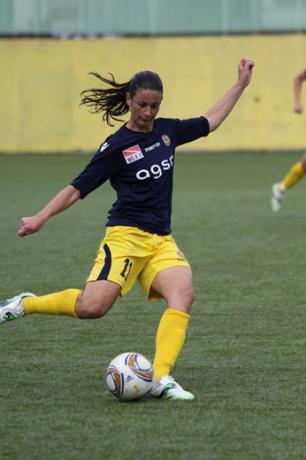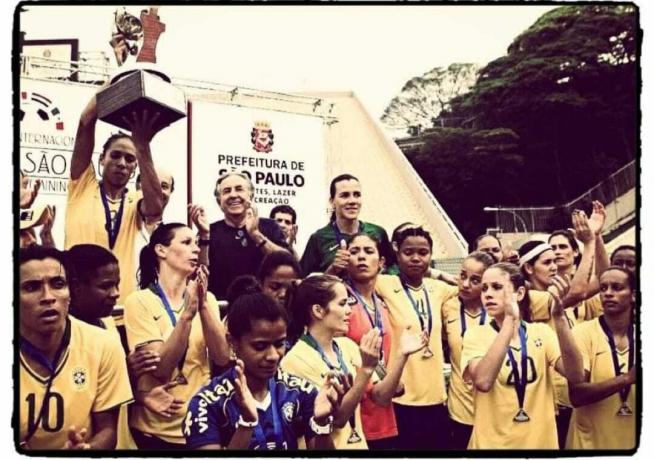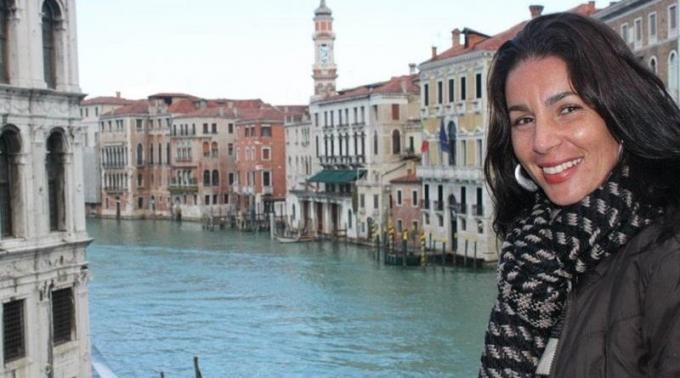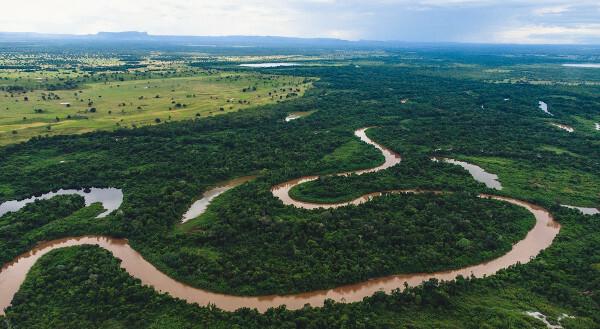In small Iretama, Paraná, Marina Aggio, still a girl, had a great desire to play soccer. As it still happens, in the 90s there was a lot of prejudice against girls practicing soccer. But, with the support of her parents, José Aggio and Luiza Toscano, the young woman decided to write her story in the modality.
At the age of 11, she already started her first experiences in the countryside. But it was at the age of 14 that professionalization began. The process was permeated with challenges, learning, pain, nostalgia and many achievements in 20 years of career.
With stints with the Brazilian national team and in several women's soccer teams in Brazil and Europe, Marina Aggio (41), nowadays, occupies another type of field, that of the classroom.
She is a teacher at physical education course of the International University Center (Uninter), researcher and lecturer on women's soccer and gender relationship in sport and also works as an advisor at the Sports and Leisure Department of Iretama (PR).
Read too:2023 Women's World Cup starts this Thursday (20)
Challenges in women's football
Marina started the professionalization process in women's football around the age of 14, when she had to move 60km from Iretama (PR) to Campo Mourão (PR).
It was just her among 150 boys. The predominantly male environment did not stop the young woman from continuing to train and play. She says that there was always respect at home, and that she brought that aspect to other spaces, "I never allowed disrespect".
One of the great challenges for women in football, highlights Marina, is prejudice. For a long time the practice was forbidden to be experienced by women in the country and this reflects in the way society deals with football nowadays, argues Marina.

Credit: Archive.
In her case, she says that she always had the support of her family and that was fundamental for her to continue and build her career in the sport.
Leaving home too early, living far from her family and missing her family, were challenging situations in these years as a professional player for the woman from Paraná.
"I would say to the Marinas who play women's football today, that the path is very arduous, there is a lot of longing, many challenges, a lot of pain, abdications. We give up many things when we leave for the world of high performance. But it's so worth it."
Marina Toscano Aggio, former soccer player, teacher and researcher
Another point that she highlights was the search for places that had a good training structure, which could maintain her high performance in the sport.

Credit: Archive.
Throughout her 20-year professional football career, she played for both Brazilian teams and European clubs. In Europe it was six years playing in Sweden and Italy.
Among the great lessons that Marina reports is the cultural exchange and the opportunity to acquire different experiences and meet people from soccer.
Check also:The history of football, all about this national passion
Brazilian Team
With 29 passages for the Brazilian national team, Marina has already entered the field with big names in women's football in Brazil, such as Marta, Formiga and Debinha.
In 2010, she won the South American Championship title along with her teammates.

Credit: Archive.
"There's a lot of pride in representing the Brazilian team, but along with that, you need wisdom in deal with the emotions that arise from being in this place, among the best in the country", says Marina.
The former player says that there is a constant comparison with the men's soccer team, since they won five world titles and they still haven't.
In this regard, she is emphatic "each one has its history, women's football has its own and men's football has another".
Read:March 8 - International Women's Day
Titles won by Marina Aggio
Check out the titles won by Marina Aggio in women's football:
Brazilian Championship (2014)
Copa do Brasil (2011 and 2014)
Paulista Championship (2013, second semester.)
Italian runner-up (2012)
Italian Cup runner-up (2012/2013, first semester)
South American Championship (2010)
Campeonato Paranaense (4 titles, 2008, 2009, 2010 and 2011)
Swedish Serie B Championship (2007)
Mineiro Championship (2002)
Paulista Champion of Society (2002)
See too:Women referee for the first time at a World Cup
From the field to the classroom
When Marina stopped playing football, in 2014, she had won the triple crown, formed by the titles of the Brasileirão, the Copa do Brasil and the Campeonato Paulista.
Marina decides to continue in the world of women's football, now from a teaching perspective. She currently works as a Physical Education teacher at Uninter.
She reports that unlike most of her fellow athletes, during her training routine she combined her undergraduate and graduate studies. She was preparing to be a teacher.
"I left the high-performance sport in which I was recognized and went into teaching, where I had to rebuild myself as a teacher. To this day I work with continuing education. Precisely for me to continue delving into research on women's football. I'm talking about gender, the difficulty in achieving equity in women's football, but I'm talking about history."
Marina Toscano Aggio, former soccer player, teacher and researcher
The teacher argues that people need to understand the history of women's football to understand women's relationship with football today.
Credit: Uninter collection.
"I'm very happy being a teacher, because I can share the practice I've had for 20 years with the theory I work with. I am very grateful to the sport. And what I can do for the sport. Today I am not on the pitch, I chose not to be a coach, supervisor... I understood that I had to be a teacher".
Marina Toscano Aggio, former soccer player, teacher and researcher
All this baggage as a soccer player enriches her process as an education professional at the university. "I work on the aspect of seeing the field and off-field scenario of sports training".
One of her cares as an educator is to work on the critical look that Physical Education professionals should have regarding women's soccer.
Do not stop now... There's more after the publicity ;)
2023 Women's World Cup
The 2023 Women's World Cup started today (20) and runs until August 20. For the first time the championship is hosted by two countries, Australia and New Zealand. Another novelty is the participation of 32 selections in the tournament.
Marina Aggio reinforces the importance of events such as the Women's World Cup, as they are broadcast on a national network. The dimension of the audience can direct girls and women who are interested in soccer to practice the modality, argues the former player.
Soccer has been banned for women in Brazil for 40 years, she emphasizes. This fact, which provokes a cultural construction, reflects on the way Brazilian society deals with the relationship between women and soccer nowadays, argues the researcher.

Credit: Personal Archive.
When major sporting events such as the Women's World Cup appear on national television, there is a process that tends to assert that football is also natural for women. This can lead to greater equality and equity in female participation in football.
From the moment TV starts to show this in a different way, another angle, a normalization process takes place. In Marina's perspective, it is important for women to practice football the way they know how, so sport can be a space for leisure and enjoyment for them.
Understanding that football is also natural for women is to promote equality and equity. So that girls and women can practice soccer without fear and prejudice, defends the teacher.
The researcher points out some challenges to be faced, such as strengthening the base categories in clubs for girls, more sports calendars over the years for the teams and more women occupying administrative, pedagogical and technical spaces in the soccer.
It is necessary to consolidate women's football as a commercial product, which generates income, money and is involved in advertising and social media, believes Aggio.
By Lucas Afonso
Journalist



